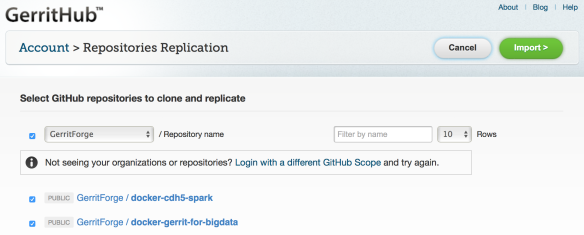Nowadays people are very careful about privacy and user data: nobody grants access to their profile without checking first the possible consequences.
We want to give the user the ability always to know and control what level of access is given to their data: that’s why we improved the way you login in GerritHub.io.
GitHub scopes: what is it?
GitHub provides the authentication and access to user’s profile using a protocol called OAuth 2.0. When GerritHub is requesting a user to authenticate is then granted a set of permissions to operate on behalf of the user on their GitHub resources, which include:
- User’s personal data (name, e-mails)
- User’s membership to organisations and teams
- User’s repositories
The set of permissions to access and operate on your data is also known as “Scope” in GitHub terms.
How is GerritHub helping me to control my access?
GerritHub has from today a new “Scope Selection” screen with two main objectives:
- Displaying your current scope and associated rights GerritHub has on your GitHub profile
- Giving you the ability to switch to a different “Scope” and consequently the rights that GerritHub has on your profile data
Transparency is good, but what is the practical added value?
There has been in the past a common complaint about GerritHub having too much or too little access to your GitHub profile:
- Too much? Why GerritHub.io needs access to my e-mail address? Why does GerritHub need to see my public keys?
- Too little? Why does GerritHub not show my private repositories in the import screen? How can I see my organisation membership in GerritHub project security screen?
With the ability now to visualise and change the current “Scope”, people can be more aware of why things are not showing up. They can make conscious decisions about how to change them with full transparency on the associated implications.
A common scenario: importing and accessing private GitHub Organisations, Teams and Repositories.
When you need to import an existing private GitHub project, you need to access information that is not publicly available:
- Your membership to a private organisation
- Your ownership of a Team structure
- Ability to clone and push your private organisations’ repositories
There is now a special information box suggesting that you have the ability to change your “Scope” if you don’t see the organisations and repositories you want to import.
After changing the scope, you can then log in again and you will have an improved set of options to get more data and repositories from your GitHub account.
Like it? Will you use it on a daily basis?
We are eager to get your feedback on this new feature: Tell us what you think and let us know what you would change or add to the set of “Scope” permissions.


